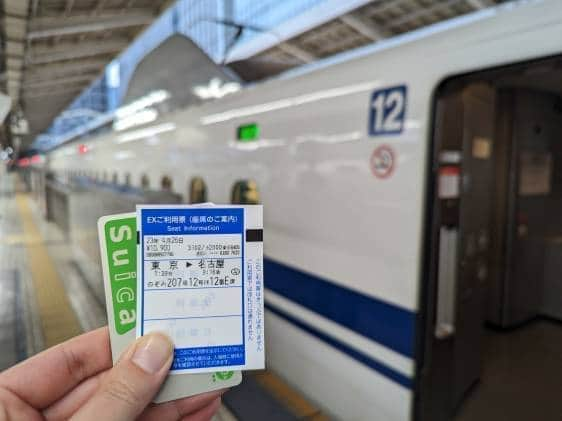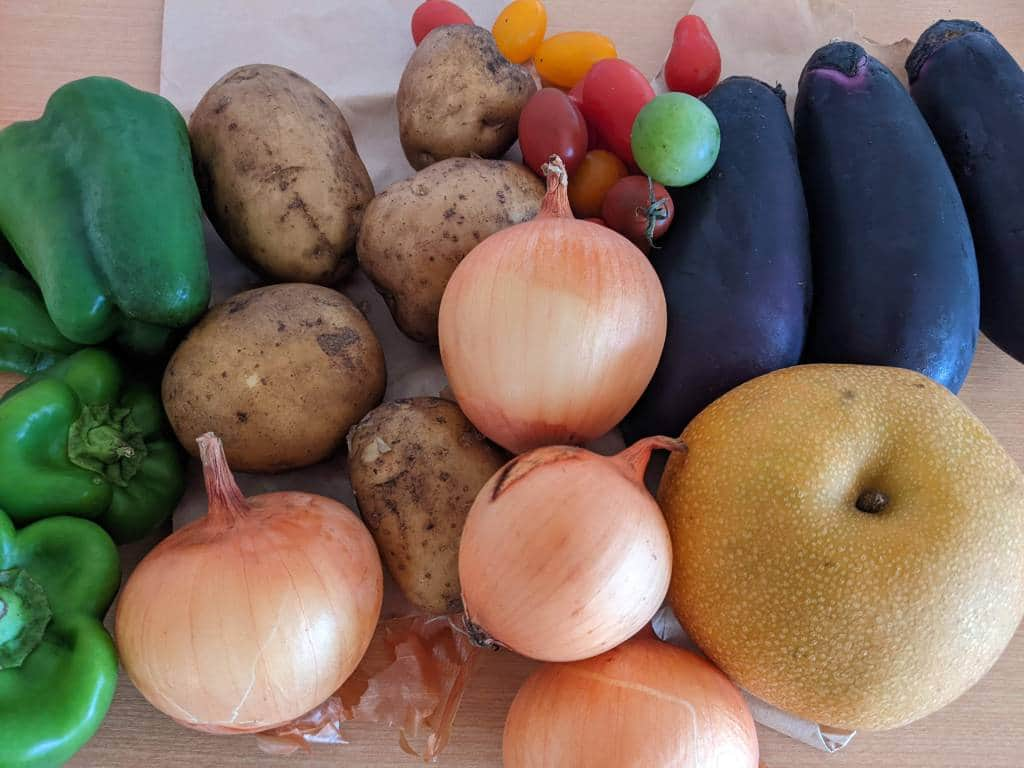If you don’t feel like dragging yourself to your nearest supermarket only to get knocked over by a ruthless, carrot-hogging auntie, then you might just want to stay on the couch and do the food shopping online this week. And we won’t judge if post-food-shop trauma steers you towards the old-faithful takeout either.
Japan is finally upping its online food shopping game with plenty of supermarkets that now deliver directly to your home. Let’s start with the main contenders.

Online supermarkets
Amazon Fresh
The convenience of Amazon Fresh generally outweighs its downsides. With access to next-day delivery in a two-hour booked time slot, English support (however janky the translation is), and organic brands like Oisix and Muji, the mandatory Amazon Prime account is a small price to pay.
If the “sporadic origins” of Amazon Fresh have you fretting, then opt for local supermarkets, Life and Valor, who are also on the site. The range of food overall is impressive with Japanese and international options including free-range eggs, whole chickens, the only hummus in Japan (hyperbolic, but I did look everywhere), meal kits, and more.

Area: For Amazon Fresh, most areas of Tokyo, Kanagawa, and Chiba prefectures; Life on Amazon, Tokyo, Kanagawa, Saitama, Chiba, Osaka, Kyoto, and Hyogo prefectures; Valor on Amazon, Aichi prefecture only. Input your postcode here to check
Minimum order: For Amazon Fresh, ¥4,000; For Life and Valor, ¥2,000
Delivery charge: For Amazon Fresh, ¥390 but free on orders over ¥10,000; For Life and Valor on Amazon, ¥390 but free on orders over ¥8,000
Positives: English available. Wide range of products
Negatives: Need a prime account to access. They do not re-deliver
Rakuten Seiyu
Rakuten Seiyu is a joint venture between conglomerate Rakuten and supermarket Seiyu, hence the name. One of the most-used online supermarkets on this list, it has ballooned in size and profit and now offers thousands of run-of-the-mill products (disappointingly no hummus).
With their large distribution centers, they can deliver quickly and effectively, sometimes even on the same day. The ever-present Rakuten ecosystem means those with a Rakuten credit card and/or points card are showered with constant deals and campaigns but for those of us without, it is much of the same.

Area: Available in 17 prefectures including Tokyo, Hokkaido, Osaka, and Kumamoto. Details are available here
Minimum order: ¥2,000
Delivery charge: ¥330 but free on orders over a certain amount depending on time slot (not all areas applicable)
Positives: Earn points. Free to join. Same-day delivery
Negatives: Japanese only. Excess plastic. Need to have or create a Rakuten ID
Aeon
One of the “big three”, Aeon differs from Amazon and Rakuten by delivering products straight from your neighborhood store. This is both a positive and a negative. Due to having thousands of stores around the country, they deliver almost anywhere—poor, Hokkaido—in Japan, but this also means you are restricted to your local shop’s prices and inventory.
The registration process is a little frustrating for non-native Japanese speakers; I had to squeeze my name into only five hiragana characters, a sure nightmare for customers with double-barrelled names. Delivery slots start a little later than usual, at noon, but if you are busy then they also have designated pick-up spots (for an extra fee).
Area: Nationwide minus Hokkaido. It will come from your local Aeon store
Minimum order: ¥2,000
Delivery charge: ¥330 but may vary depending on the area and time
Positives: Collect Waon Points. Bulk fruit available
Negatives: Japanese Only. Limited to your store’s stock
National Azabu
The Azabu Juban area in Tokyo is a hub for international residents, so it’s little wonder that they have their own supermarket dedicated to serving that clientele with English-speaking staff and website. National Azabu is filled to the brim with imported goods so you can finally fill your (online) baskets with sought-after cheeses, meats, and vegetables. Plus, they boast vegan, CBD-oil, and gluten-free products. Unfortunately, the delivery area is not as big as their food selection.

Area: Setagaya, Shibuya, Minato, Chiyoda, Meguro, and Shinagawa wards. Available areas can change depending on the time of day. Check online here
Minimum order: None
Delivery charge: ¥550 but free for orders over ¥5,000. Member discounts available
Positives: English available. International food
Negatives: The delivery area is small. Slightly expensive
Other
Maruetsu: Another of our favorite neighborhood grocery stores
Life: If you don’t want to go through Amazon, get it directly
Pal System: Once-a-week delivery service that boasts competitive prices
Organic
If shopping for chemical-free organic food is important to you, then check out this wide, free-range selection.
Tengu Natural Foods
While not having the greatest selection available, Tengu Natural Foods makes up for it with an ergonomic, English website. As a vegetarian and organic food supplier based in Saitama, they source food from farms around the world and are adamant about using the word ‘organic’ correctly. You can search via your trusted organic certification such as JAS (Japanese Agricultural Standards) and shop for your lentils and chickpeas without worry.
Area: Nationwide
Minimum order: No minimum
Delivery charge: Kanto, ¥660; Okinawa, ¥1,100; Other, ¥880; surcharge of ¥330 for frozen and chilled goods (paid individually); free shipping for orders over ¥5,250
Positives: English available. Earn points. Discounts are available if you spend a certain amount
Negatives: Closed over the weekend. Limited products
Radish Boya

Radish Boya is a subsidiary of Oisix ra Daichi which also consists of Oisix and Daichi wo Mamoru Kai organic online supermarkets (also worth checking out). They focus on large, pesticide-free vegetables and other farm-born products. Following their self-coined “Radix Standard”, they strive for honesty and sustainability by displaying pesticide usage for all their greens and reducing packaging. Be careful though, you can’t pick individual items and the same box will keep coming if you don’t alter it.
Area: Nationwide
Minimum order: Must choose one of the box sets
Delivery charge: Free shipping on orders over ¥5,000. Complimentary annual membership fee the first year and ¥1,100 every year after that
Positives: Less waste (delivered in box). Sustainable goals. Upfront with product information. Trial set available
Negatives: Japanese only. Expensive. Difficult to use
Bio Marche
Bio Marche has both an online supermarket and regular delivery box service. The latter declares all their produce as “100% organic” and JAS-certified, while the online supermarket also has processed and non-organic foods.
Bio Marche Net Shopping contains a surprisingly fleshed-out catalog which includes brand-made food such as honey, sauces, tinned tomatoes, and nuts. They’ll deliver your products three days from your order while their home delivery service will ship your desired box to you once a week.
Area: Nationwide
Minimum order: Bio Marche Net Shopping, no minimum; Bio Marche Home Delivery, box set purchase required
Delivery charge: Bio Marche Net Shopping, from ¥1,210 to ¥2,860 depending on the area or free shipping on orders over ¥15,000; Bio Marche Home Delivery, annual membership fee of ¥5,500 required
Positives: 100% organic (home delivery only)
Negatives: Japanese only. Expensive
Other
Green Co-op: Committed to fostering a healthy home environment, they deliver organically sourced groceries regularly once a week.
Farm-to-table
If you want to be able to trace your food directly to its source, then farm-to-table online shopping is probably for you.
Ark Farm
Ark Farm opened its online store in 1999, around 20 years before mammoths Amazon and Rakuten. Humble in their origins, the majority of their goods are shipped directly from the mountain-top Tategamori Ark Farm in Iwate Prefecture. They sell UCAPP-safe, free-range eggs (with photographic evidence for those who’ve been burnt before), mouth-watering pudding, and home-reared pork. While the shipping fee and 7-day wait might make this a one-time purchase, if you subscribe to a box you’ll get worthwhile discounts.
Area: Nationwide
Minimum order: No minimum
Delivery charge: Up to ¥3,000 (Okinawa) depending on your area and items. Check here
Positives: Occasional discounts. No need to register. Great gift sets. Support farms
Negatives: Online shop is Japanese only. Expensive and slow shipping. Limited choice
Tabe Choku
Follow farmers instead of influencers with Tabe Choku. Their unique spin on a traditional home delivery service will have you connecting directly with the farmers you are buying from. In doing so, you can receive harvest-fresh vegetables, exchange messages, and maybe brush up on your Japanese in the process.
This is the perfect way to support local workers while also receiving delicious and sometimes rare ingredients. The only downside is creating a rapport with the perfect farmer can be time-consuming and sometimes delivery costs can be very high. It’s not ideal for your weekly shop but recommended for those who want to support their community.
Area: Nationwide
Minimum order: No minimum
Delivery charge: Differs on farmer chosen
Positives: Easy-to-use website. Unique opportunity
Negatives: Japanese only. Time-consuming. Shipping can be expensive. Limited options
Kasamatsu Farms
Kasamatsu Farms is a family-run farm in Fujino, Kanagawa Prefecture that ships organic produce directly to consumers. They claim to have “truly free-range” eggs rather than the “technically free-range” eggs you can get elsewhere. They ship their multi-colored eggs to buyers throughout Japan, but other vegetables—including a few varieties of kale, herbs, and some rarities such as sunchokes, are available in-season.
Area: Nationwide
Minimum order: Limited sign up available for regular egg deliveries, delivered every other week (crate of 45 eggs)
Delivery charge: Included for the crate of 45 eggs
Positives: Genuine organic, cruelty-free food straight from the farm
Negatives: A bit pricey, also availability of different produce varies from week to week
Other
Aoyama Farmers Market: An in-person farmers market held every weekend, since the pandemic they have promoted online farms on their website.

Imports and others
We won’t go too in-depth on international shopping, that’s the job of this article, but we’ll quickly summarize where to find your home comforts.
Ambika: “Bringing India closer” with a wide range of special spices, beans, flour, wines, and more
Asia Superstore: A great place to find those elusive Asian oils, pastes, sauces, and other goods
The Meat Guy: If you are all about the meat, then look no further. The Meat Guy supplies exotic meat like alligator and kangaroo as well as succulent turkey, ribs, and chicken
Kaldi Coffee Farm: Their online store has much of the same international products that we love about Kaldi
The Flying Pig: While Costco doesn’t deliver in Japan, The Flying Pig is the next best thing. Though be warned, the markup is pricey






























